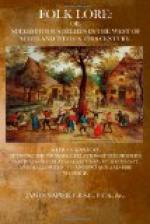It was a prevalent belief that the seventh son in a family had the gift of curing diseases, and that he was by nature a doctor who could effect cures by the touch of his hand. It was reported that such a man resided in Iona, who had effected cures by rubbing the diseased part with his hand on two Thursdays and two Sundays successively, doing so in the name of the Father, the Son, and the Holy Ghost. It was requisite to the cure that no fee should be taken by such endowed persons. In the West of Scotland the formula of cure was different in different localities; in some parts a mere touch was all that was necessary, in others, and this was the more general method, some medicine was given to assist the cure.
Written charms were also believed in as capable of effecting cures, or, at least, of preventing people from taking diseases. I have known people who wore written charms, sewed into the necks of their coats, if men, and into the headbands of petticoats if women. These talismans, in many cases, I have little doubt, did real good in this way, that they supplied their wearers with a courage which sufficed to brace up their nervous system—which drove out fear, in fact,—a very important condition for health, as physicians well know. These talismans were so generally and thoroughly believed in, and so numerous and apparently well-attested were the evidences of their beneficial effects, that in years not long past, medical men believed in their efficacy, and promulgated various theories to account for it.
It was also an accepted belief that diseases could be transferred to animals, and even to vegetables. Cures held to be so effected were, according to one medical theory, cures by “sympathy.” A few instances, culled from a work published during the latter half of the seventeenth century (1663), entitled The Usefulness of Experimental Philosophy, will illustrate this theory:—A medical man had been very ill of an obstinate marasmar (?) which so consumed him that he became quite a skeleton, notwithstanding every remedy which he had tried. At length he tried a sympathetic remedy: he took an egg, and having boiled it hard in his own urine, he then with a bodkin perforated the shell in different parts, and then buried it in an ant-hill. As the ants wasted the egg he found his strength increase, and he soon was completely cured. A daughter of a French officer was so tormented by a paronychia




